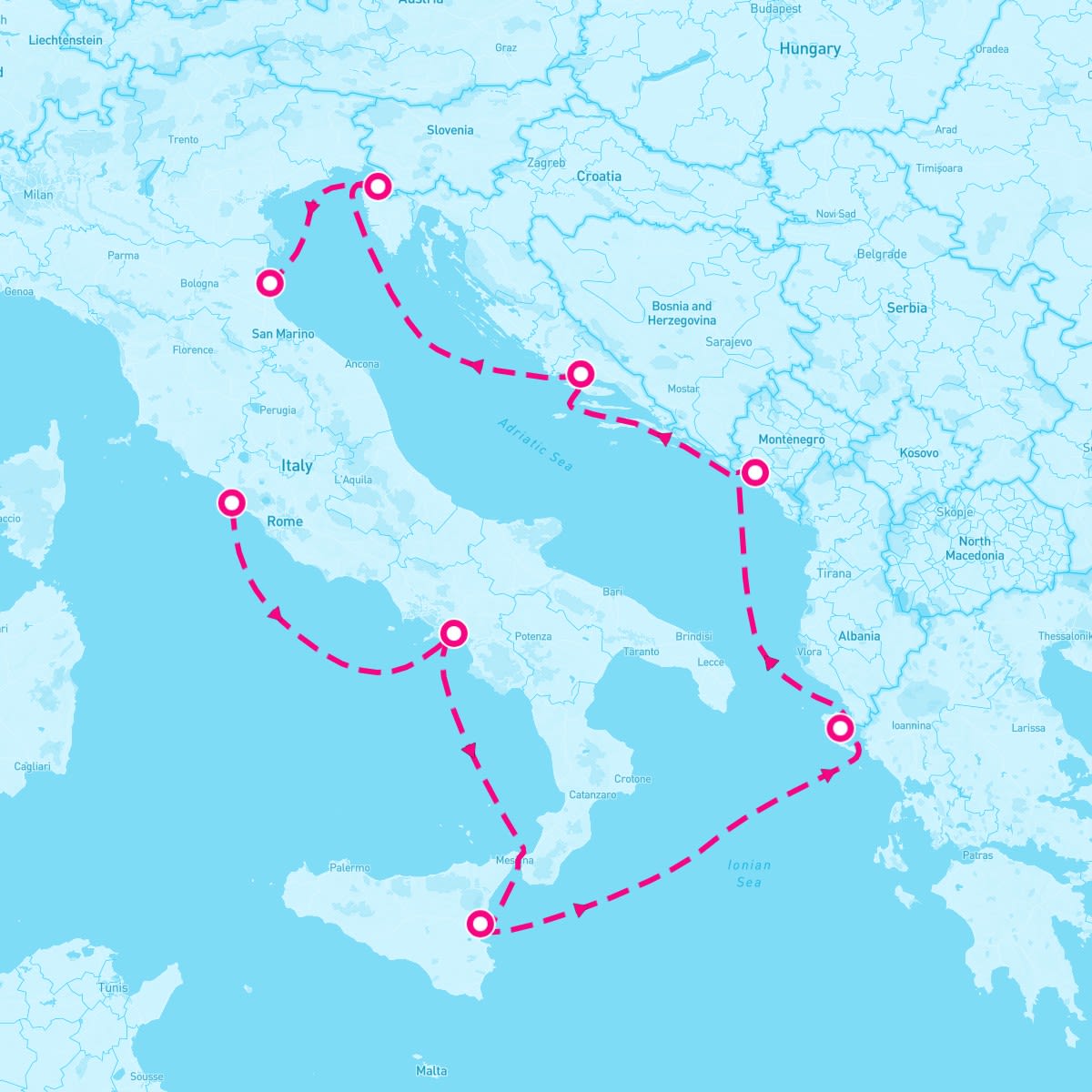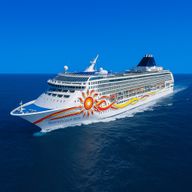

Norwegian Sun - 8/22/2027
The August 22, 2027 cruise on the Norwegian Sun departs from Civitavecchia (Rome), Italy. On this 7 Night Mediterranean: Italy Greece & Croatia (Rome To Ravenna) sailing, the ship will visit a total of 8 cruise port destinations, including its departure port. The Norwegian Sun sets sail on Sunday, Aug 22nd and returns on Sunday, Aug 29th.
Cruise Pricing
The graph below tracks historic price of the Norwegian Sun cruise ship departing August 22, 2027. The most recent price for this sailing starts at $1,239 ($177 per night) for an Inside Cabin. Compared to the average price of $1,232 ($177 per night), this represents a recent increase of 1%.
Use the buttons below to toggle between cabin types.
Cruise Itinerary
Itinerary
Norwegian Sun - August 22, 2027 - 7 Nights
| Day | Date | Port |
|---|---|---|
| 1 | Aug 22nd | Civitavecchia (Rome), Italy |
| 2 | Aug 23rd | Salerno (naples), Italy |
| 3 | Aug 24th | Catania, Sicily |
| 4 | Aug 25th | Corfu, Greece |
| 5 | Aug 26th | Kotor, Montenegro |
| 6 | Aug 27th | Split, Croatia |
| 7 | Aug 28th | Koper, Slovenia |
| 8 | Aug 29th | Ravenna, Italy |
The Norwegian Sun sails on August 22, 2027 for a 7 Night Mediterranean: Italy Greece & Croatia (Rome To Ravenna). The ship will depart the port of Civitavecchia (Rome), Italy at 5:00 PM and will return to the port of Ravenna, Italy on Aug 29th at 6:00 AM. During the 8-day journey, the Norwegian Sun will visit 7 additional ports and will spend 0 days at sea.
Itinerary Safety Score
Based on my comprehensive research of cruise port safety information, including recent crime reports, travel advisories, Global Peace Index rankings, and specific port security concerns, we've created a "safety score" for each cruise port stop. The overall rating below represents a combined score for your specific cruise itinerary.
Cruise Ship

Norwegian Sun
NORWEGIAN SUN SIZE
The Sun has a construction date of 2001 and a total size of 78,309 gross tons. The ship measures 848 feet (258 meters) in length. Norwegian Sun is included in Norwegian’s Sun Class. At full capacity, the Norwegian Sun holds 2,842 passengers. That includes 1,936 cruise vacationers and 906 staff members. The Sun total number of staterooms is 968.
Norwegian Sun Size & Stats
- Gross Tonnage:78,309 GT
- Length:848 ft (258 m)
- Beam:123 ft (37 m)
- Draft:26 ft (8 m)
- Max Speed:26 mph (23 kn)
- Year Built:2001
- Years Served:2001 - Present
- Capacity:1,936
- Crew Members:906
- Total on Board:2,842
- Total Staterooms:968
- Flagged Country:Bahamas
- Ship Cost:330 Million
- Status:active
To see how this compares, click through to see Norwegian Sun age and stats vs all Norwegian ships. There you’ll find graphs showing length, capacity, tonnage and more for this ship vs all in the fleet.
To check out the ship from top to bottom, click here for Norwegian Sun Deck Plans.
Cruise Ports
Civitavecchia (Rome), Italy, offers docking at Civitavecchia Port with excursions to Rome. Travelers explore Colosseum and Pantheon. Excursions visit Vatican City’s Sistine Chapel. Local markets sell gelato. The peak season, April to October, brings warm weather for city tours. Photography captures ancient ruins and Tyrrhenian vistas. Dining onboard includes carbonara, an Italian favorite. Souvenirs, like Murano glass, are sold in ship shops. Briefings cover Roman history. Light clothing and sun protection suit the Mediterranean climate, while comfortable shoes enhance historic walks. Civitavecchia’s cultural gateway offers a vibrant Italian stop. Cruise travelers enjoy a mix of ancient landmarks and scenic coasts, making Civitavecchia an engaging destination. (126 words)
Salerno (Naples), Italy, offers docking at Salerno Port with excursions to Naples. Travelers explore Pompeii’s ruins and Amalfi Coast villages. Excursions visit Capri’s Blue Grotto. Local markets sell limoncello. The peak season, April to October, brings warm weather for coastal tours. Photography captures ancient ruins and Tyrrhenian vistas. Dining onboard includes pizza margherita, a Neapolitan favorite. Souvenirs, like ceramic crafts, are sold in ship shops. Briefings cover Roman history. Light clothing and sun protection suit the Mediterranean climate, while comfortable shoes enhance ruin walks. Salerno’s historic allure offers a vibrant Italian stop. Cruise travelers enjoy a mix of archaeological sites and coastal beauty, making Salerno an engaging gateway to Naples.
Catania, Sicily, Italy, docks at Porto di Catania, 1 kilometer from downtown, with taxis for 10-minute rides. The city, population 310,000, features the 11th-century Catania Cathedral. Travelers visit Piazza del Duomo for the Elephant Fountain. Local markets sell pistachio pastries. Excursions to Mount Etna, 1 hour north, offer crater hikes. Peak season May to September; taxis 5-10 EUR. Dining includes pasta alla Norma at trattorias. Souvenirs feature lava stone crafts.
Corfu, Greece, offers docking at Corfu Port. Travelers explore Old Fortress and Achilleion Palace. Excursions include Paleokastritsa’s beaches. Local markets sell kumquat liqueur. The peak season, May to September, brings warm weather for coastal tours. Photography captures Venetian architecture and Ionian vistas. Dining onboard includes pastitsada, a Corfiot favorite. Souvenirs, like olive oil, are sold in ship shops. Briefings cover Ionian history. Light clothing and sun protection suit the Mediterranean climate, while water shoes enhance beach exploration. Corfu’s cultural charm offers a vibrant Greek stop. Cruise travelers enjoy a mix of historic fortresses and scenic beaches, making Corfu an engaging destination for exploring Greece’s Ionian Islands. (126 words)
Kotor, Montenegro, offers docking at Kotor Port. Travelers explore Old Town walls and St. Tryphon Cathedral. Excursions include hiking Lovćen National Park. Local markets sell njeguški pršut. The peak season, May to September, brings warm weather for coastal tours. Photography captures medieval alleys and Adriatic vistas. Dining onboard includes cicvara, a Montenegrin favorite. Souvenirs, like olive wood crafts, are sold in ship shops. Briefings cover Illyrian history. Light clothing and sun protection suit the Mediterranean climate, while sturdy shoes enhance fortress hikes. Kotor’s historic charm offers a vibrant Montenegrin stop. Cruise travelers enjoy a mix of UNESCO landmarks and scenic bays, making Kotor an engaging destination. (126 words)
Split, Croatia, offers docking at Split Port. Travelers explore Diocletian’s Palace and Marjan Hill. Excursions visit Trogir’s historic center. Local markets sell soparnik. The peak season, May to September, brings warm weather for coastal tours. Photography captures Roman ruins and Adriatic vistas. Dining onboard includes pašticada, a Croatian favorite. Souvenirs, like lavender crafts, are sold in ship shops. Briefings cover Dalmatian history. Light clothing and sun protection suit the Mediterranean climate, while comfortable shoes enhance palace walks. Split’s cultural charm offers a vibrant Croatian stop. Cruise travelers enjoy a mix of UNESCO landmarks and scenic hills, making Split an engaging destination for exploring Croatia’s Adriatic coast. (126 words)
Koper, Slovenia, has docking at Koper Port. Travelers explore Tito Square and Praetorian Palace. Excursions visit Postojna Cave’s karst formations. Local markets sell truffles. The peak season, May to September, brings warm weather. Photography captures Venetian architecture and Adriatic views. Dining onboard includes jota, a Slovenian stew. Souvenirs, like olive oil, are sold in ship shops. Briefings cover Slovenian history. Light clothing and sun protection suit the Mediterranean climate. Comfortable shoes enhance city walks. Koper’s coastal charm offers a serene Slovenian stop, blending Venetian heritage with scenic beauty.
Ravenna, Italy, offers docking at Ravenna Port. Travelers explore UNESCO-listed Byzantine mosaics and Dante’s tomb. Excursions visit Bologna’s medieval towers. Local markets sell piadina. The peak season, April to October, brings mild weather for historic tours. Photography captures ancient basilicas and Adriatic vistas. Dining onboard includes tortellini, an Emilia-Romagna favorite. Souvenirs, like mosaic crafts, are sold in ship shops. Briefings cover Byzantine history. Light clothing and sun protection suit the Mediterranean climate, while comfortable shoes enhance mosaic walks. Ravenna’s artistic heritage offers a vibrant Italian stop. Cruise travelers enjoy a mix of historic mosaics, cultural landmarks, and coastal charm, making Ravenna an engaging destination for exploring Italy’s Adriatic heritage.